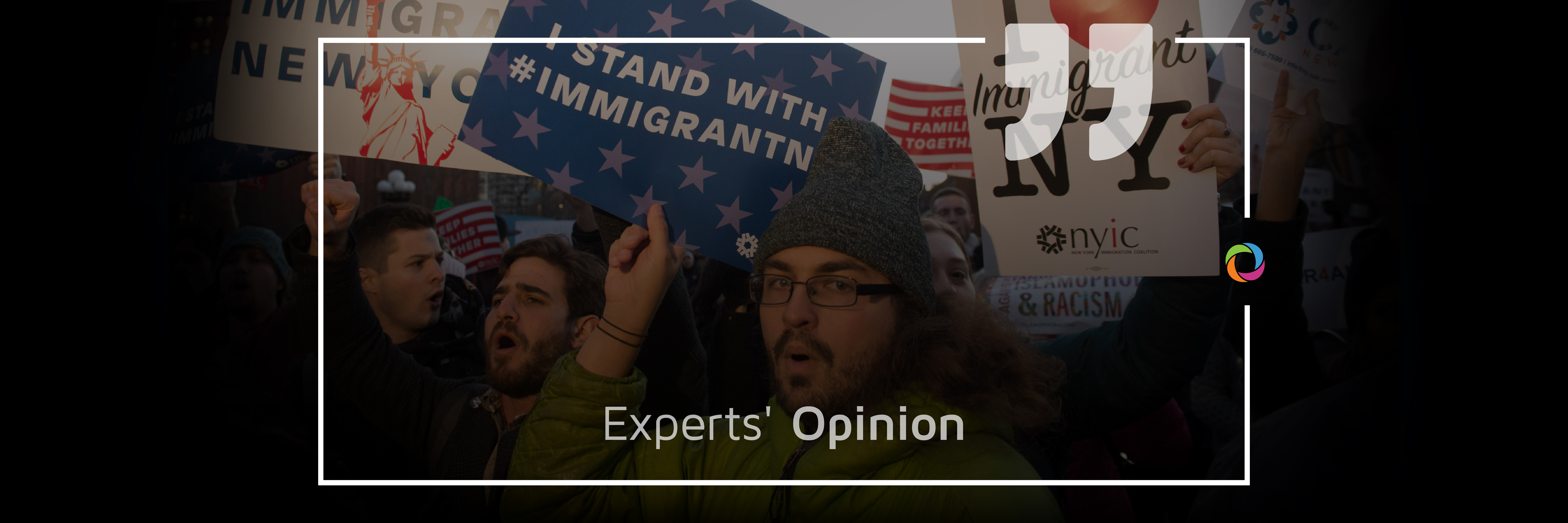At the end of April, the USA president, Donald Trump, signed an executive order suspending immigration into the US to protect American jobs and to prevent the spread of the “invisible enemy” of the coronavirus pandemic. This decision has created many worries among immigrants. Who is most affected by Trump’s US immigration ban and what will the long-term impact be? These are the questions we addressed to several migration experts.
Who is most affected by Trump’s US immigration ban?

“The order is in line with Trump’s main immigration policies, the central pillars of which are increased border security, ending the diversity visa lottery, restrictions on family-based immigration and a decrease in refugee resettlement programs. The ban is closing pathways to citizenship while maintaining a flow of exploitable immigrant labor. In this regard, irregular migrants, refugees and seasonal workers are the most affected communities of Trump’s immigration ban. Furthermore, unaccompanied refugee children and other vulnerable groups are severely affected by the policy.”

“Trump’s new order hostilely and exponentially targets individuals who are legally eligible to become permanent residents. The ban particularly affects those who seek to settle in the USA for the long term and the relatives of already permanent residents. These immigrants constitute almost half of all individuals granted permanent resident status and disproportionately come from Asia, Latin America, Africa and Eastern Europe. The directive strikes especially hard against individuals eligible to immigrate based on family ties (about 80% of residents admitted from abroad). The order also has a highly uneven effect on persons eligible for permanent resident status under the diversity visa program halted by Trump, under which permanent resident visas are made available every year to suitable individuals from countries from which there would otherwise be low immigrant admissions. Since almost all diversity-based immigrants are admitted from outside the United States, Trump’s order effectively suspends the diversity visa program in its entirety.”

“The immigrants who fled Central American were mostly from the North Triangle although it is more normal to see people from Venezuela and Cuba. In general, all those migrants crossed through Mexico and tried to take cover under the Migrant Protocol Protection (MPP), the agreement that turned Mexico into a supposed safe third country. It considerably affects asylum seekers because, since the implementation of this program, these migrants have returned back to the border cities of Mexico where they suffer the same persecution from organized crime and all the systemic violence of the Mexican State. Paradoxically, as cross-border security continues to be strengthened through strategic cooperation between the governments of Mexico and United States, the activity of mafias towards these migrants continues to increase. Trump’s US immigration ban does not consider the long record of human rights violations towards forced migration from Latin America, not even when those displacements came from enemy political regimes, let alone when these migrants are fleeing from poverty and violence. The Washington administration is promoting the fact that countries like Guatemala and Honduras have agreed to be safe third countries despite the fact that the majority of asylum seekers come from these nations.”

„This ban will adversely affect the green card applicants seeking US residency, those who are not US citizens and want to have a right to work and live in USA. The migrants from various categories of work visas, especially on H1-B visas are the most affected. Despite having a valid H1-B visa, president Trump’s order does not allow these people to return to work for 60 days. Many of those are from India and have worked in the US for up to 10 years. The duration of the immigration ban can be extended by the administration, depending on the pandemic conditions.”

“Trump’s executive order suspending immigration into the US for 60 days has very profound effects both in the US and internationally. Internationally, refugees and vulnerable people fleeing persecution worldwide will be denied an important protection tool – third country resettlement – since the executive order directly puts a hold on permanent immigration to the US.”
What will the long-term impact be?

“The ban will impact immigration movements into the IT sector in the US from India and China, being two countries with large migration numbers globally. In the long term, people from war and crisis zones will find less chance to seek refugee help in the USA. As a leading country on migration patterns, tougher migration policies in the USA will motivate other countries to restrict migration policies.”

The Trump administration’s immigration measures could result in the US losing highly talented or skilled immigrants which could negatively impact the American economy and society. In addition, a fact widely known is that the US would never have become the world’s leading economy without the contribution of immigrants who make substantial economic contributions to the country’s economy. In the mid and long term, Trump’s immigration policies could establish a perceived hostile environment to which to migrate to, closed to newcomers, including those with high levels of education or specialized skills.”

“The United States Citizenship and Immigration Services (USCIS), the bulk of whose operational funds are derived from the visa applications of immigrants entering the US, is one of the agencies that will require a US government bail-out due to budget shortfalls. Internationally, suspension of immigration and protection which is a major part of the US foreign policy could lead to major ramifications worldwide as other nations emulate what the US had done hence abdicating their moral responsibilities to refugees and asylum seekers in the name of national security.”

“In the COVID-19 pandemic situation, many US citizens have lost jobs, this decision was therefore taken to provide as many jobs as possible to US citizens. Moreover, in next few months, the USA will go through the presidential election process to elect the next President. In the 2016 presidential election, the immigration ban announcement worked well in the favour of President Trump so this time he is again trying to use this ban to this advantage. All qualified US citizens will probably have more opportunities of employment in future. At the same time, the USA will no longer remain a land of opportunity if the immigration ban is continued for a couple more years. The coronavirus pandemic is surely changing the world order by providing opportunities to some and snatching them away from some others – including both individuals and nations.”

“This answer highlights the incompatibility between human rights and forced migration, an incompatibility that has characterized Trump’s administration. The long-term impact refers to the lack of greater ethical considerations in the context of humanitarian crises in which these human displacements are found beyond the restrictive and border-containment policy decisions that prevail. This happens when the responsibility inherent to the condition of any State for the protection of immigrants as people in vulnerable situation disappears. The humanitarian crisis of forced migrations on the border between Mexico and United States will continue to deepen alarmingly, even more so in the context of a pandemic where forced migrants cease to be taken as bargaining chips for Trump’s election campaigns to become a health risk. Therefore, this ban represents one of the most complex and controversial issues that continues to re-conceptualize the concept of forced migration for existing legislations. For now, in the year 2020, there is a dead end for asylum seekers and, in terms of migratory transit, considering the role of countries like Mexico is another gray area as regards the political treatment of this situation being a “safe third country” when asylum seekers suffered all possible human rights violations there.”
Check more than 25 job opportunities in migration sector here.

